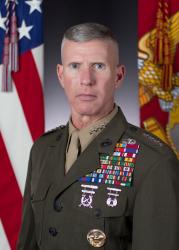2024
Force Design 2030 launched a transformational initiative to ensure that the U.S. Marine Corps can continue to respond effectively in contested environments to ever-evolving global threats. Six years into implementation, the Marine Corps continues its modernization effort—improving plans through experimentation and learning—to address the pacing threats outlined in the National Defense Strategy.
On July 2, the Strobe Talbott Center for Security, Strategy, and Technology at Brookings hosted Commandant of the Marine Corps General Eric Smith to discuss the progress made to date, including how the Marines continue to refine Force Design 2030 while balancing modernization with the Corps’ crisis response mission and renewing focus on quality of life issues for all Marines.
Online viewers submitted questions via email to [email protected] or via X (formerly Twitter) @BrookingsFP using #ForceDesign.
Registration is required to attend an event in person and guests at Brookings are required to attest to their state of health before attending. Visitors may not enter the building if they are feeling ill for any reason, have any symptoms commonly associated with COVID-19, have recently tested positive for COVID-19 and do not yet meet the criteria to resume normal activities based on current CDC guidance, or have been advised by their healthcare professional or otherwise to not enter any space where some persons may not be vaccinated.
Agenda
-
July 2
-
Discussion
Moderator
 Michael E. O’Hanlon Director of Research - Foreign Policy, Director - Strobe Talbott Center for Security, Strategy, and Technology, Co-Director - Africa Security Initiative, Senior Fellow - Foreign Policy, Strobe Talbott Center for Security, Strategy, and Technology, Philip H. Knight Chair in Defense and Strategy @MichaelEOHanlon
Michael E. O’Hanlon Director of Research - Foreign Policy, Director - Strobe Talbott Center for Security, Strategy, and Technology, Co-Director - Africa Security Initiative, Senior Fellow - Foreign Policy, Strobe Talbott Center for Security, Strategy, and Technology, Philip H. Knight Chair in Defense and Strategy @MichaelEOHanlon
-


